
Catalan, known in the Valencian Community and Carche as Valencian, is a Western Romance language derived from Vulgar Latin. It is the official language of Andorra, and a co-official language of three autonomous communities in eastern Spain: Catalonia, the Valencian Community and the Balearic Islands. It also has semi-official status in the Italian comune of Alghero. It is also spoken in the Pyrénées-Orientales department of France and in two further areas in eastern Spain: the eastern strip of Aragon and the Carche area in the Region of Murcia. The Catalan-speaking territories are often called the Països Catalans or "Catalan Countries".
The phonology of Catalan, a Romance language, has a certain degree of dialectal variation. Although there are two standard dialects, one based on Eastern Catalan and one based on Valencian, this article deals with features of all or most dialects, as well as regional pronunciation differences. Various studies have focused on different Catalan varieties; for example, Wheeler (1979) and Mascaró (1976) analyze Central Eastern varieties, the former focusing on the educated speech of Barcelona and the latter focusing more on the vernacular of Barcelona, and Recasens (1986) does a careful phonetic study of Central Eastern Catalan.

Enric Valor i Vives was a Spanish narrator and grammarian who made one of the most important contributions to the re-collection and recovery of Valencian lexicography and its standardization in the Valencian Community, Spain.

Feliu Formosa Torres is a Catalan dramatist, poet and translator. He has served as dean of Institució de les Lletres Catalanes.
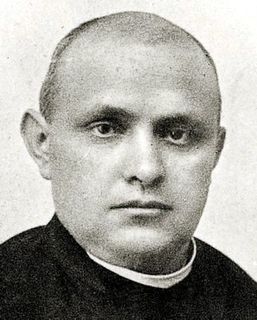
Father Antoni Maria Alcover i Sureda, also known as Mossèn Alcover was a modernist Majorcan writer, who wrote on a wide range of subjects including the Catholic Church, folklore and linguistics. He is chiefly associated with efforts to revive interest in the Catalan language and its dialects. Among his works was a Catalan-Valencian-Balearic dictionary.

Josep Maria Benet i Jornet, also known as "Papitu", was one of the most renowned Catalan playwrights, considered one of the main renewers of Catalan theater.
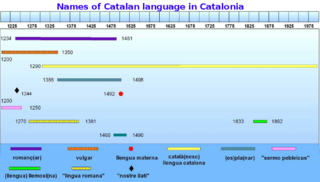
The first names, or glossonyms, of the Catalan/Valencian language formed in a dialectal relation with Latin, in which Catalan existed as a variety. These names already expressed the relationship between the two languages. New names that related Catalan to Rome came about to dignify the Catalan language in the thirteenth century, though Latinists called it vulgar and the people planus, or pla.

Jordi Valls i Pozo is a Catalan poet.

Josep Maria Espinàs i Massip is a Catalan language writer, journalist and publisher known for his novels, travel writing and newspaper articles.
This article discusses the conjugation of verbs in a number of varieties of Catalan, including Old Catalan. Each verbal form is accompanied by its phonetic transcription. Widely used dialectal forms are included, even if they are not considered standard in either of the written norms: those of the Institut d'Estudis Catalans and the Acadèmia Valenciana de la Llengua. Other dialectal forms exist, including those characteristic of minor dialects such as Ribagorçan and Algherese and transitional forms of major dialects.

Francesc de Borja Moll Casanovas was a Spanish linguist, philologist and editor from Menorca. He wrote many books on the Catalan language and its varieties spoken on the Balearic Islands. He was also the main collaborator with Father Antoni Maria Alcover in his Diccionari Català-Valencià-Balear.

The Catalan language originated from Vulgar Latin in the Pyrenees Mountains between France and Spain. It diverged from the other Romance languages in the 9th century. At that time, Catalan spread quickly throughout the Iberian peninsula when the Catalan counts conquered Muslim territory. By the 11th century, the Catalan language was present in several feudal documents. Catalan was present throughout the Mediterranean by the 15th century. At that time, the city of Valencia was thriving.
Germà Colón i Doménech was a Spanish philologist of Romance philology and Catalan lexicology. He was appointed a professor at the University of Basel, in Switzerland.
The Premi d'Honor de les Lletres Catalanes is an award instituted by Omnium Cultural since 1969 to recognize a person by their scientific or literary work, written in Catalan language, the importance of their work and his/her significant contribution to cultural life of the Catalan Countries.
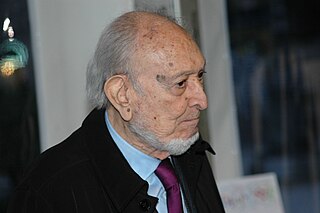
Josep Maria Castellet Díaz de Cossío, also known as José María Castellet, was a Spanish Catalan writer, poet, literacy critic, publisher and editor.
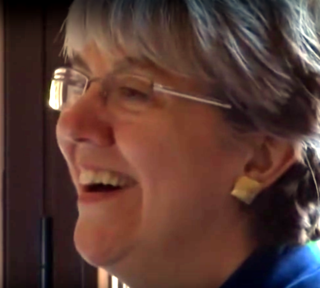
Maria Mercè Roca i Perich is a Catalan writer and politician. She was deputy to the Parliament of Catalonia for Republican Left of Catalonia, and currently serves as a councillor at the City Council of Girona for the same party.
Emili Boix-Fuster is a sociolinguist. His main academic interests are sociolects, intergenerational language transmission and linguistic ideologies in Catalan-speaking territories.
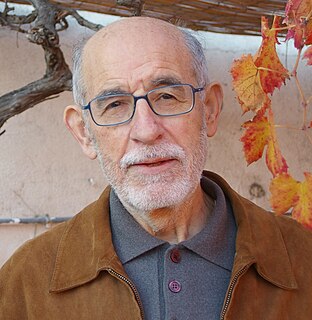
Joan Solà Cortassa was a Catalan linguist and philologist. He was professor of Catalan language and literature at the University of Barcelona from 1984 onwards, and vice president of the Institut d'Estudis Catalans (IEC) from 2009.
Kálmán Faluba is a Hungarian philologist whose work has helped to make the Catalan language more well known in his country.

Margarida Aritzeta i Abad (Valls, July 20, 1953) is a writer and was a professor of literary theory and comparative literature at the University Rovira i Virgili (Tarragona) until September 2018.














